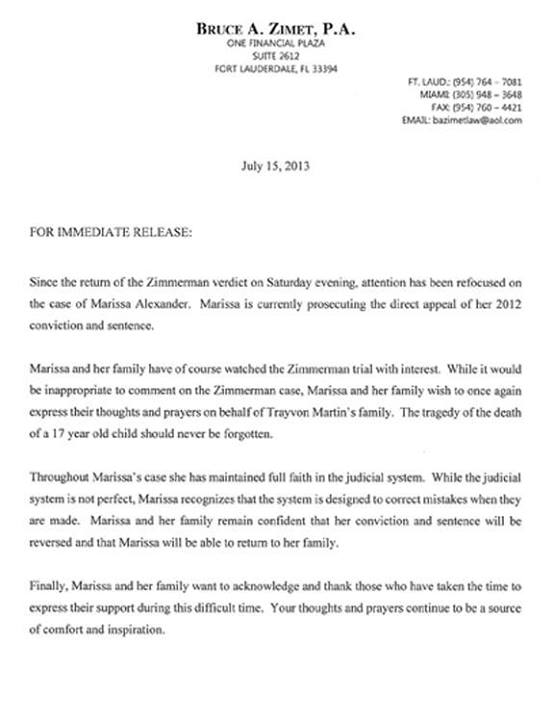
FLORIDA STAND YOUR GROUND LAW & DOMESTIC VIOLENCE
'Stand Your Ground' Fails to Protect Abused Wife
A Florida mother who fired a warning shot to defend herself from an abusive husband is facing 20 years in jail, despite the state's now-famous 'Stand Your Ground' law.
31-year-old mother of three Marissa Alexander fired a single shot into the ceiling as she attempted to escape her 36-year-old husband, Rico Gray.
In a 2010 deposition, Gray admitted to "four or five" previous incidents of domestic violence involving Alexander. Describing one of those incidents, which resulted in Alexander going to the hospital, he said, "We was staying together and I pushed her back and she fell in the bathtub and hit her head." An ex-partner of Gary's, Chartrissia Anderson, who has a 9-year-old daughter with him, has also come forward to describe the violence she suffered at Gray's hands.
This is how Alexander –- who had just given birth nine days before the incident — described being shoved, strangled and held against her will on that August 2010 night, per the blog set up by her first husband, Lincoln Alexander, on her behalf:
He and my two stepsons were supposed to be exiting the house thru the front door, but he didn't leave. Instead he came into the kitchen that leads to the garage and realized I was unable to leave. Instead of leaving thru the front door where his vehicle was parked outside of the garage, he came into the kitchen by himself. I was terrified from the first encounter and feared he came to do as he had threatened. The weapon was in my right hand down by my side and he yelled, "B*** I will kill you!", and charged toward me. In fear and desperate attempt, I lifted my weapon up, turned away and discharged a single shot in the wall up in the ceiling. As I stood my ground it prevented him from doing what he threatened and he ran out of the home. Outside of the home, he contacted the police and falsely reported that I shot at him and his sons [from a previous relationship]. The police arrived and I was taken into custody.
"I believe when he threatened to kill me, that's what he was absolutely going to do. That's what he intended to do. Had I not discharged my weapon at that point, I would not be here," she told CNN.
Four months after her arrest, a judge rejected Alexander's attempt to seek immunity under Florida's "Stand Your Ground" law, saying that she could have escaped her husband "through the front or back door." In March, a jury took just 12 minutes to return a guilty verdict against Alexander for three counts of aggravated assault. Last week a judge denied Alexander's request for a new trial; she is set to be sentenced on May 11 where under Florida mandatory sentencing law, she faces a 20 year sentence. So why doesn't the 'Stand Your Ground' law apply to her?
Instead, argued Melissa Harris-Perry on Sunday, "this is the rule of what occurs for women and for men who are in situations of domestic violence" — that the law will not protect them if they defend themselves from abusers. She spoke to Brooklyn Law School professor Liz Schneider, who said:
"I'm a lawyer and a law professor and since the 1970s. I've worked on cases and written about problems of cases involving self-defense, involving battered women that either kill or assault, and these are terrible cases. And there are cases in which women often serve a very long period of time. They are convicted by juries or sent to prison for long terms by judges."
"The kinds of understandings that judges and juries bring show a lack of understanding of the history of abuse, a lack of sensitivity to women who have experienced abuse, and a sense that these women cannot be reasonable, which is a critical facet of what the self-defense laws require. And so you see [cases like Alexander's] not only I want to say sadly in this country, but I've also worked on cases around the globe, you see this around the world."
Harris-Perry asked Kim Dadou, a domestic violence survivor who served 17 years in a New York state prison for shooting her abusive boyfriend to death — and is now with the Correctional Association of New York, fighting for a new bill to help incarcerated survivors of domestic violence — "why is the victim blamed in a domestic violence situation?"
"It's bullying within the home," Dadou said. "There's a big outcry against bullying, but that's what domestic violence is. [People ask] 'why didn't you leave?' I was reading on Marissa's case and it says that they said she should have left through the front door or through the back door and not the garage."
"Well, you know what? I say to those people, I am so glad you've never known that kind of fear that paralyzes you, or that kind of fear or that kind of danger that prevents you from going out the front door or the back door, and you're trapped within your own home. and how — how can you blame the victim?"
"You don't blame a rape victim for being raped because she had on tight jeans. Why do you blame a domestic violence victim for staying in her own home? You're re-victimizing the victim."